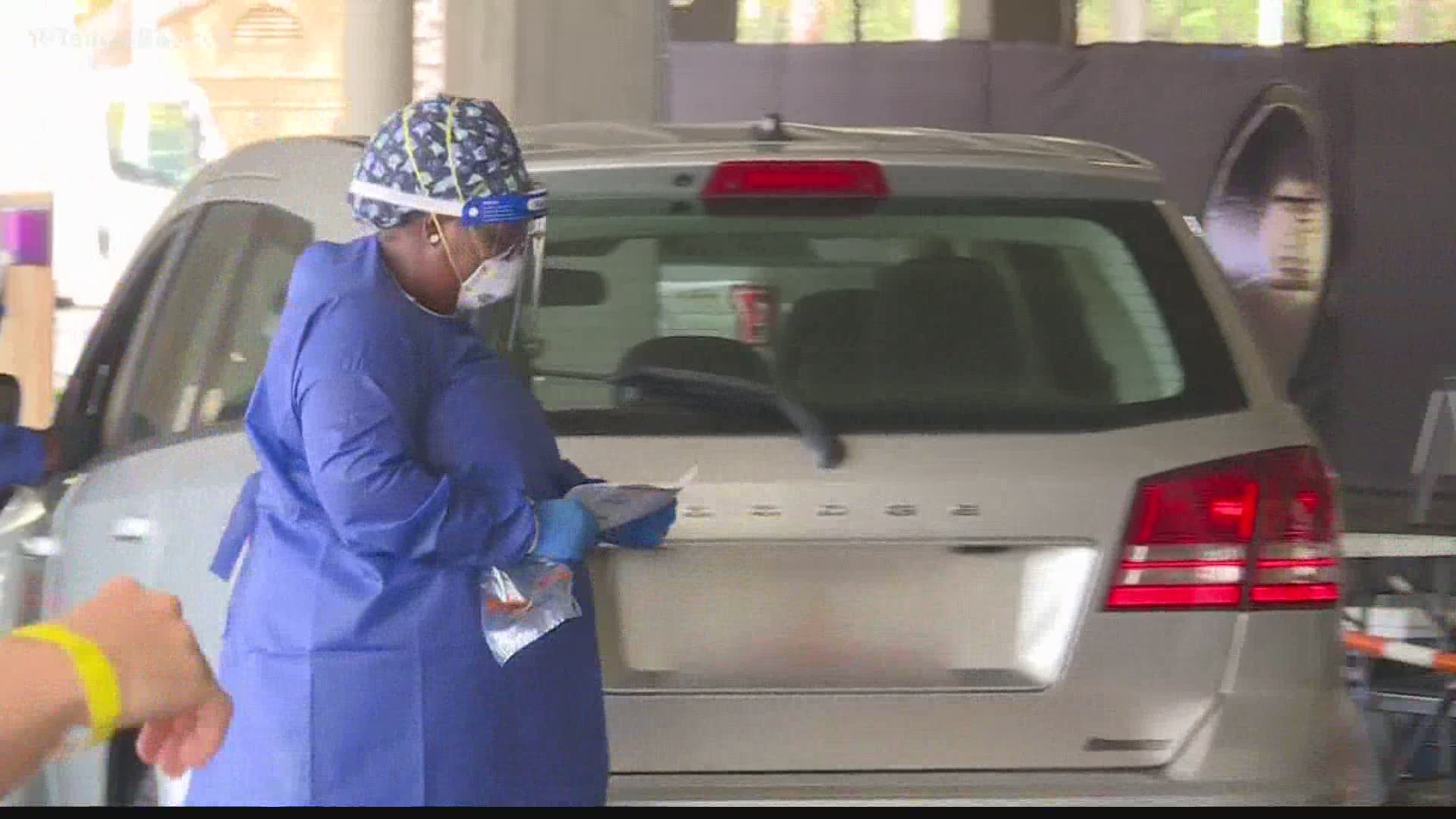TAMPA, Fla. — This story is the latest installment in our YouTube series, "What's Brewing,” investigative reporter Jenna Bourne's series of homemade deep dives into important issues during the coronavirus pandemic. Click here to check out the series and subscribe to our new YouTube channel: The Deeper Dive.
As the number COVID-19 infections grows in Florida, contact tracing has become a hot mess.
“If we’re taking 10-14 days to process tests, then contact tracing is almost worthless,” said Dr. Marie Bourgeois, research assistant professor at the University of South Florida's College of Public Health.
The purpose of contact tracing is to limit the spread of infection.
Contact tracers reach out to people who’ve tested positive for COVID-19, find out who else they may have infected, then warn those people.
We’ve seen just how easily coronavirus can spread from person-to-person.
Sara Sohn says at least three people she spent time with, in the days before her COVID-19 symptoms began, also tested positive.
“My sister is immune-compromised and she – I did end up giving it to her. Or, that’s probably where she got it. And so, that’s also been really scary and not a good feeling, especially since I had been so careful beforehand,” said Sohn.

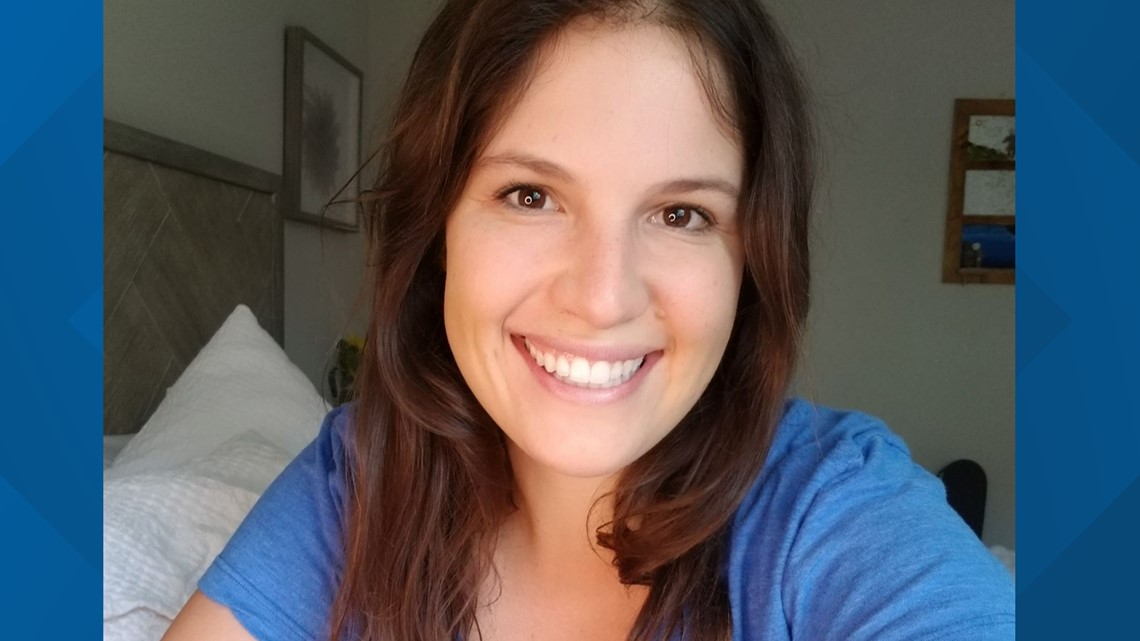
How contact tracing is supposed to work
After a local health department is notified someone has tested positive for COVID-19, a contact tracer tracks down the infected patient.
They then request contact information for the people they were around, starting at least two days before showing symptoms.
But not everyone -- only people who were within 6 feet for 15 minutes or more at a time.
“’On this day, you had contact with an individual who has been confirmed positive for COVID-19.’ We don’t say names, we don’t use pronouns,” Florida Department of Health contact tracer Jewel Bernard told 10 Investigates.
So, does Florida have enough contact tracers?
Here’s what the Department of Health said when we asked in late May, a time when the department said it had 1,522 contact tracers:
“It is absolutely an adequate number right now,” said Florida Department of Health Deputy Secretary for Health Dr. Shamarial Roberson. “We’re making sure that we have an appropriate amount of staff in every county, and we assess that on a daily basis.”
But the state doesn’t seem to be able to accurately identify how many contact tracers are in each county.
10 Investigates sent the Florida Department of Health a public records request for a county-by-county breakdown of contact tracers.
The agency responded with a spreadsheet titled “Epi Staff for COVID-19 Response.”
When we pointed out that we asked for the number of contact tracers, not epidemiologists, Director of Communications Alberto Moscoso said that’s this column on the end, outlined in red:

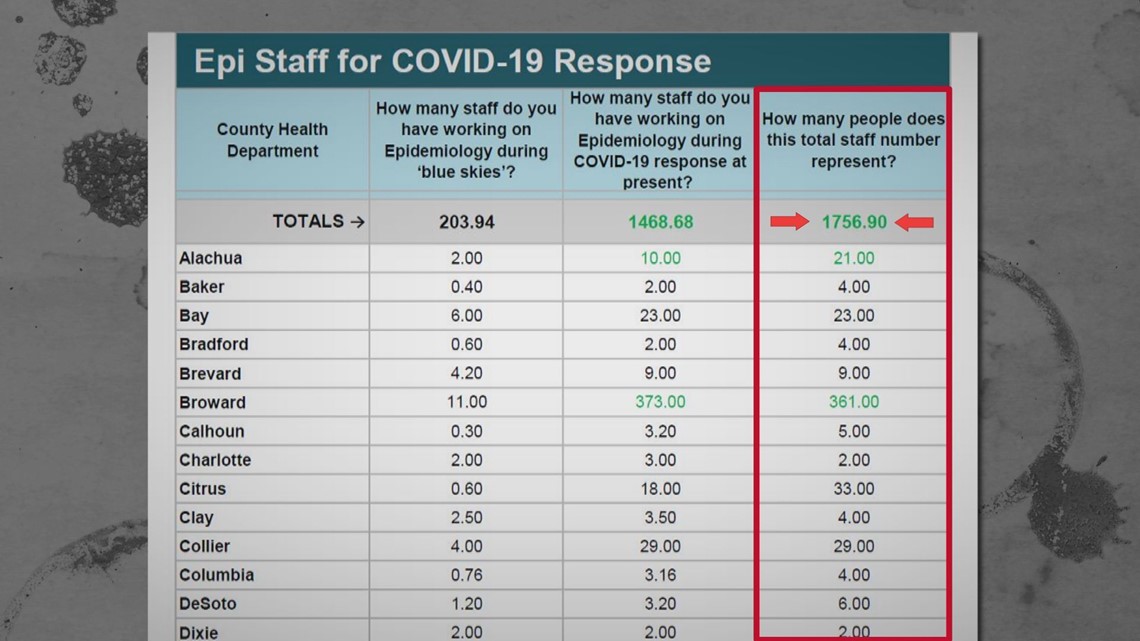
But here’s the problem with that.
The total number, 1,757, doesn’t match what Moscoso told 10 Investigates just days before.
In an email, he said “More than 2,000 individuals, including students, epidemiologists and other staff from across the Department, are currently involved in contact tracing every positive case of COVID-19 in Florida. The Florida Department of Health also engaged with MAXIMUS, a widely recognized company with previous experience in supporting governmental agencies, to hire an additional 400 contact tracers...”
That statewide number isn’t the only discrepancy in the spreadsheet.
The state spreadsheet says Hillsborough County has 55, but the Hillsborough Department of Health says they actually have 115 contact tracers.
And while the state spreadsheet says Manatee County has 24, the Manatee County Health Department says it has 16 contact tracers.
The Florida Department of Health hasn’t been able to explain these discrepancies, which makes it impossible to identify exactly how many contact tracers there are in the state or where they are.
What we do know is there aren’t enough. The National Association of County and City Health Officials recommends 30 contact tracers per 100,000 people during the COVID-19 crisis.

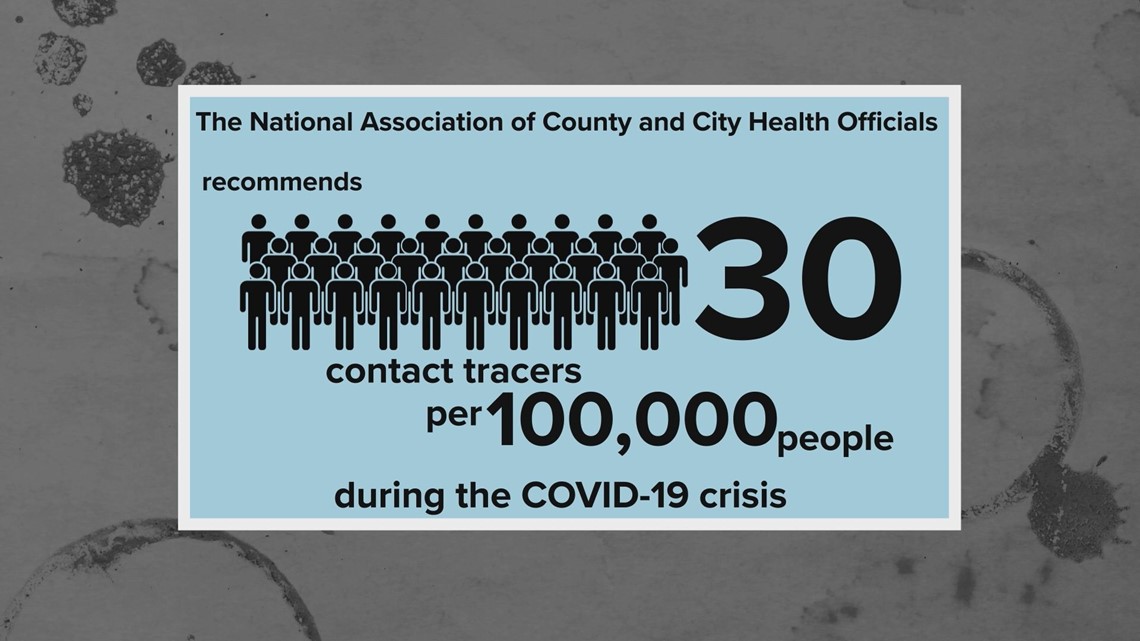
That means Florida, with its estimated population of about 21.5 million, would need 6,443 contact tracers.
That’s almost three times more than the number the state claims it has – but, again, hasn’t been able to provide any documentation to prove it.
Florida may be spending too little, too late on contact tracing
“I’ve already greenlighted $138 million for the Department of Health to support not just contact tracing, but other personnel,” said Florida Gov. Ron DeSantis on July 7, after a journalist questioned him on the state’s number of contact tracers.
That same day, the state was reporting a record number of COVID-19 deaths.
Even that new injection of funding wasn’t enough.
Both the Hillsborough and Pinellas Departments of Health asked their county governments for more contact tracing funding.
Pinellas County tells 10 Investigates it’s going to spend about $43 million of its CARES Act funding from the feds on contact tracing and other public health measures.
Hillsborough County issued an emergency purchase order of $750,000 in CARES Act funding to support contact tracing.
Dr. Bourgeois, who did some contact tracing when she was deployed to Miami at the beginning of the pandemic, said it’s a struggle for contact tracers to keep up with all the new cases in the state.
“Right now, we’re seeing a lot of cases. It’s very difficult,” said Bourgeois.
“Places like the Tampa Bay region, where it’s spiking pretty significantly right now, is going to be really hard for contact tracers to keep up, certainly with the current numbers, and even if you augment it where we’re really behind the eight-ball, quite frankly,” said Dr. Marissa Levine, Director of the Center for Leadership in Public Health Practice at USF.
Test result delays make contact tracing “almost worthless”
Even if Florida had the recommended number of contact tracers, many Floridians are now waiting 1-2 weeks to get their COVID test results.
“The delay is maddening and potentially harmful,” said Bourgeois. “It’s very difficult to effectively conduct contact tracing if you don’t have rapid turnaround… Because in the amount of time it takes to get that test result, those people have already interacted with so many other people in the public that it makes it extremely difficult to control the infection.”
Especially if it also takes days for a contact tracer to reach out.
“I would say it was five days after I was initially diagnosed, the contact tracer called me to ask me about where I had been and what I had been doing,” said Sohn. “And then the following day, they actually called me again. I think that they maybe thought that they hadn’t called me, or I was still on some list.”
While Sohn says she was called twice, 10 Investigates has also heard from several Florida coronavirus patients, like emergency department nurse Danielle Weaver, who say they never heard from a contact tracer.
“Up until the point where I tested positive, I had been working. And, you know, in a pretty high-risk job, obviously,” said Weaver. “They didn’t ask me about any of the coworkers I had been working with or any of the patients I had taken care of.”

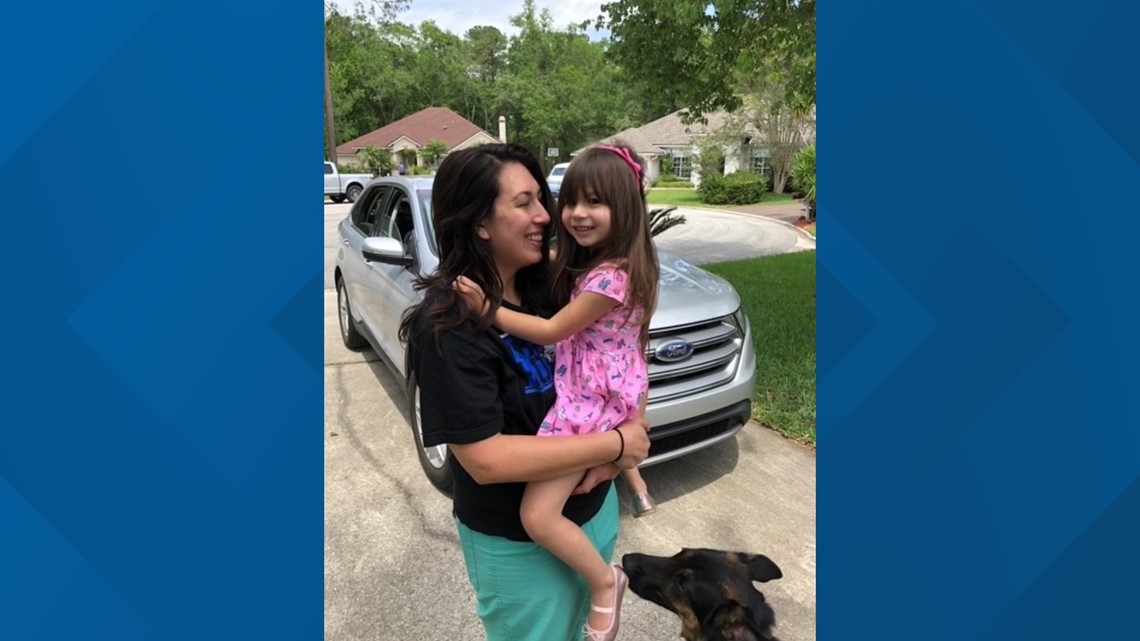
10 Investigates sent the Florida Department of Health a public records request for the number of Florida COVID-19 patients who have been contacted by contact tracers.
We haven’t gotten a response yet.
The coronavirus patients that contact tracers do reach don’t always cooperate.
Bourgeois said some worry they’re being scammed.
“Some people wouldn’t give us any information at all because they didn’t think that we needed to know it and they didn’t think that we would keep their information confidential, and they found our questions intrusive. Some people would answer the questions about themselves but refused to give us any information about their contacts,” said Bourgeois.
So, is Florida contact tracing a hot mess?
The answer is yes.
Contact tracing has to be part of a bigger effort where, at a minimum, people are wearing masks and socially distancing, and where we’re able to get coronavirus test results more quickly.
- Tropical Storm Gonzalo develops, expected to become a hurricane by tomorrow
- 'Have at it': Gov. DeSantis OKs school districts opening later to ensure safety
- Florida Sen. Rick Scott says his grandchildren will start 'distance learning'
- Florida reports another 9,440 cases, 136 deaths from coronavirus
- Sheriff: 'Kind of guy who would punch you in the face for no reason', 2 others arrested in triple murder
- SOLVED: The disappearance of Melissa Gormley
- Here are the reopening plans for Tampa Bay school districts
FREE 10 TAMPA BAY APP:
►Stay In the Know! Sign up now for the Brightside Blend Newsletter

